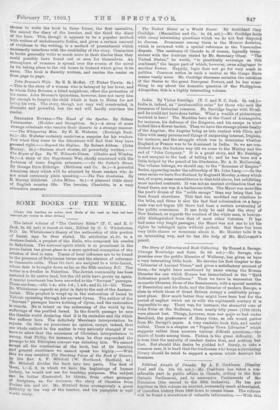SOME BOOKS OF THE WEEK.
[under ode heading we notice such Books of the week as hew, not bun reserved .1.01• rosiest, in other forme.] The latest volume of "The Century Bible" (T. C. and E. C. Jack, 2s. 6d. net) is Isaiah xt..lovi., Edited by 0. C. Whitehouse, D.D. Dr. Whitehouse's theory of the authorship of this portion ef Isaiah may be thus stated. He attributes xlelv. to a deutero-Isaiah, a prophet of the Exile, who composed his oracles in Babylonia. The national spirit which is so prominent in the proto-Isaish has given place to a more spiritual conception of the relation of God to man. Traces of local influence are to be found In the presence of Babylonian terms and the absence of reference to Canaanite cults. Then lvielxvi. are assigned to a trito-Isaiah, whose date is brought down as far as the fifth century B.C. The writer is a dweller in Palestine. The Jewish community has been restored to its native land, but the old evils have grown up again. A special treatment has been ate:lorded to the " Servant " passages. These are four,—xlii. 1-4; xlix. 1-6; I. 4-9 ; and lii. 13—liii. These Dr. Whitehouse regards as prior in date to the rest of the deutero- Isaiah. This prophet is wrapt up in the restoration of Israel by Yahveh operating through his servant Cyrus. The author of the "Servant" passages knows nothing of Cyrus, and the restoration Is remote. He is intent on the redeeming of the world by the sufferings of the purified Israel. In the fourth passage he sees the Gentile world declaring that it is Its maladies and ills which the sufferer bore. The definitely Messianic interpretation he rejects. On this we pronounce no opinion, except, indeed, that our whole outlook in the matter is very seriously changed if we have to allow that the eonsensus of Christian interpretation is Wrong, that Philip, for instance, when he thus expounded the pessage to his Ethiopian convert was deluding him. We cannot accept all the conclusions if the book, but of its learning and general excellent* we cannot speak too higlaly,—With this we may mention The Teaching Value of the Book of Genesis, by the Rev. A. F. Mitchell (W. Northoud, Sheffield, 4d.) Mr. Mitchell divides the book into two parts. The first of these, i.—ii. 9, in which we have the beginnings of human history, he would not use for teaching purposes. The subject Min be better illustrated, he thinks, from other passages of Scripture, as, for instance, the story of Creation from Nelms xix. and civ. Mr. Mitchell faces courageously a great difficelty in the way of the teacher, and his pamphlet is well worth study.






































 Previous page
Previous page